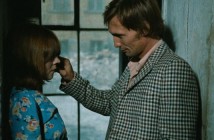
Antibirth
Antibirth
Danny Perez (Oddsac), the bastard love-hate child of David Cronenberg, John Carpenter, and David Lynch, returns to Sundance after a six-year absence with Antibirth, a semi-worthy, cult-friendly entry in the body-horror sub-genre that originated with Cronenberg four decades (e.g., Shivers, Rabid, Scanners, The Brood). Antibirth centers on Lou, a marginal, marginalized substance abuser (drugs and alcohol, not necessarily in that order and often at the same time) who, after another night of wild partying, blacks out, only to gradually, grudgingly realize she’s more than likely pregnant; not only pregnant, but pregnant by nefarious, possibly supernatural or extraterrestrial means. Pregnancy, however, doesn’t convince Lou to stop or even slow down her hard partying ways. She continues doing drugs, drinking alcohol, and smoking cigarettes she can get her hands on. In short, she’s always looking to get drunk, stoned, or tweaked, whatever dulls the emotional pain and mental anguish being sober presents for Lou. Whoever coined the phrase “unfit mother” was obviously on to someone exactly like Lou. She’s almost completely unrelatable, let alone sympathetic. The toxic self-abuse continues despite every suggestion to the contrary, including advice from her sometime best friend (apparently Lou’s only friend too), Sadie (Chloë Sevigny), and Sadie’s drug dealer/boyfriend/all-around low-life, Gabriel (Mark Webber). When a desperate, anguished Lou calls her pregnancy an “infection,” it’s both a disturbingly accurate statement of Lou’s state of mind at that particular moment in time and Perez’s overarching theme about pregnancy as a body-snatching takeover (a theme made gorily, repulsively explicit in Antibirth’s final moments). It’s also a sign of the body-horror to come. It’s all the more disappointing then that Perez rushes the climax, trading in themes and subtext for a bloody, grisly finish. Body-horror fans won’t be disappointed, but non-body-horror fans certainly will be.

Christine
Christine
To paraphrase Anton Chekhov, you don’t introduce an auto and gun repair shop – and you certainly don’t introduce a .38 special – unless you (you being a character, not whoever might be reading this review at the moment) you expect to use the firearm in the third act. That’s exactly what moviegoers can expect from the “based on a true story” Christine, Antonio Campos’ follow up to 2012’s Simon the Killer. The Christine Chubbuck (Rebecca Hall) we meet in the film hasn’t turned 30 yet, but she’s already failed as a TV journalist in one major market, Boston (where several unspecified incidents led to her dismissal) to the relatively small market of early ‘70s Sarasota, Florida where she leads the community affairs segment on the nightly show. Christine has high-minded ideals about journalism. She’s brought into the J-school ideas about integrity and objectivity, about the potential for investigative journalism to shed a light on political (and other corruption), on serving the public as a bulwark against overreaching government intrusions. Under pressure from the station owner, the station manager, Michael (Tracy Letts), pushes Christine and her co-workers to pursue “juicy,” ratings-improving stories (i.e., “If it bleeds, it leads”). Christine’s idealism doesn’t get her far (idealism tends to crumble when confronted by reality). She resists compromise at every turn, in effect further delaying her dream of returning to a major market. Christine’s idealism isn’t her only problem (assuming idealism is a problem). She’s also facing health problems, including a lifelong struggle with chronic/clinical depression worsened by her workplace setbacks and the typical, typically casual sexism and misogyny present in the early 1970s. But without Christine inevitably tragic end, it’s hard, if not impossible, to imagine Christine’s story deserving anything beyond a Wikipedia.
Goat
Life lessons abound in Goat, Andrew Neel’s adaptation of Brad Land’s fraternity-centered memoir, with “Don’t join a college fraternity” first and foremost. There’s also a life lesson involving the “stranger danger” rule, a rule the fictionalized Brad (Ben Schnetzer) violates almost immediately, letting social rules of behavior and bourgeois mores and not his flight or fight instincts take over when a shifty-eyed, hoody-wearing white dude asks him for a ride after a college party. Brad assumes the ride asker and his equally shifty-eyed, hoody-wearing friend have stepped out of his brother Brett’s (Nick Jonas, once again proving himself a surprisingly capable actor) party. He makes a mistake that almost costs him his life. Within minutes, he’s left on the side of a country road, bloodied, beaten, and traumatized. After a slow, summer-long recovery, Brad decides to both attend Brett’s college and pledge the same fraternity that Brett calls his “brothers.” With Brad trying to live up to an outdated, potentially dangerous masculine code – a Social Darwinist code where hazing, the assorted humiliations, physical, mental, and emotional, dictate who becomes a full brother and who becomes an ostracized, feminized other. It’s no accident that Neel opens Goat with a circle of screaming, shirtless men engaging in ritualized behavior. It’s tribalism, ancient, instinctive, and primal in action. We’d like to think we’ve evolved beyond our tribal-based behaviors, of course, but the repeated revelations of fraternity hazing suggests otherwise. While Neel delivers a highly polished product, an obvious reflection of his talents and skills behind the camera, Goat’s narrative too often slips into borderline clichés. The pledges, young, white, and not particularly smart, willingly agree to semester-long hazing. In exchange, they’ll receive all of the privileges and benefits of being a member of a college fraternity (mostly social status, but as one raw pledge confesses, access to college girls too). Goat also suffers from repetitive, redundant scenes, scenes that add to an overlong running time that eventually mutes whatever Neel wants to say about college fraternities and the personal journeys of Brad and Brett.
Jacqueline (Argentine)
Herewith a public service announcement for prospective first-time filmmakers. There’s nothing wrong with admiring the individual and collective cine-essay works of Jean-Luc Godard, Chris Marker, and Werner Herzog. In fact, regardless of whether filmmakers see themselves as primarily or even exclusively as narrative or documentary filmmakers should closely study the cine-essay form. What they shouldn’t do, however, is attempt to out-Herzog Herzog (or any filmmaker) when they decide to make their first, feature-length film. Unfortunately, it’s far too late for Bernardo Britto. His first film, Jacqueline (Argentine), a mock or faux meta-documentary, should never have made it to the big (or small) screen, at least not in its current misshapen form. Jacqueline (Argentine) purports to center on Jacqueline Dumont, a twenty-something French woman who claims she worked for the French equivalent of the CIA and since absconded to a small village in Argentina with super-secret, potentially damaging information, specifically a CIA assassination attempt on a politician running for office in the United Arab Emirates (UAE). A wannabe filmmaker (Wyatt Cenac) sees the perfect opportunity to advance his career and make a potentially world-changing documentary. He manages to find enough funding for his project to cover his expenses and two, relatively inexperienced interns. Even before they arrive in La Falda, Argentina, though, they openly question the veracity of Jacqueline’s story. At worst, they’ll out a liar and re-focus their documentary on her and her numerous lies (if, in fact, they’re lies). To his credit, Britto isn’t short on ambition, but the execution leaves far too much to be desired. From the running meta-joke of the over-enthusiastic, control-freak director’s constant, constantly unneeded voiceover narration (a meta-joke Britto should have dropped ten minutes in and not seconds before the end credits rolled) to the painfully predictable plot turns involving Jacqueline and the flash drives she supposedly stole, but has kept away from the documentary crew for some reason (i.e., not involving delayed narrative gratification) to the slippery search for seemingly unobtainable truth of the objective kind, Jacqueline (Argentine) doesn’t just disappoint in whole or in part, but consistently fails on every imaginable level (not counting a praise-worthy cast giving their all when they obviously shouldn’t. For Britto, maybe the lessons learned here will translation in a significantly improved second film.
Agnus Dei (Les Innocentes)
At least stateside, Catholicism has taken a hit, a hard hit, most of it self-inflicted over the last two or three decades, the partial result of the pedophilia scandal of the late 1990s and early 2000s (all too often, attempts at cover-up are worse than the underlying crime, but certainly not here). For anyone raised as a Catholic, faith, not the spiritual kind, but of the institutional kind, were (and are) hard to come by. The media, both on the narrative side and the non-narrative one, reflected, advanced, and accelerated(again, accurately) the Church’s fall from grace. It’s almost a minor miracle then to encounter a film like Agnes Dei, a French/Polish co-production directed by Anne Fontaine (Adore, Gemma Bovary, Coco Before Chanel), that takes matters of faith, spiritual and otherwise, with the seriousness and respect they’ve rarely received on the big or small screen. Set in the winter months after the close of World War II in Europe – Poland, to be more specific – Agnus Dei centers on a Catholic convent and the nuns there who find themselves in a moral, ethical, and spiritual crisis: Raped by Soviet soldiers months earlier, eight women are pregnant and nearing their respective delivery times. Angus Dei deftly contrasts the nuns’ struggles with a French doctor, Mathilde Beaulieu (Lou de Laâge), treating the remaining French soldiers in Poland before they’re repatriated home. Raised by Communist parents, Mathilde has little interest or room in her belief system for the nuns, initially refusing the desperate pleas of a novice nun before a combination of curiosity and compassion draw her to the convent. Grudgingly at first, but willingly later, the nuns let Mathilde into their lives both as a doctor and friend. Fontaine skillfully sketches in the varying personalities of the nuns, but saves the deepest, complex characterization for Sister Maria (Agata Buzek), the convent’s voice of reason and second in command to the Mother Superior (Agata Kulesza). Filled with beatific, Bresson-inspired imagery, but just as grounded in the inner and outer realities of the nuns and Mathilde, not to mention (but we’ll mention it anyway), earthy humor courtesy of Mathilde’s lover and fellow doctor, Samuel Lehmann (Vincent Macaigne), Agnus Dei is nothing less – and sometimes more – than a cinematic revelation.



